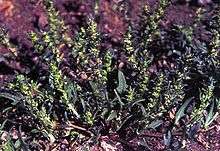Blitum nuttallianum
Blitum nuttallianum,[1] (syn. Monolepis nuttalliana) is a species of flowering plant in the amaranth family known by the common names povertyweed[2] and Nuttall's povertyweed.[3] It is native to North America, where it is widespread and common from Alaska to Mexico to New England. It can be found in many types of habitat, including disturbed areas, often favoring wet places. It is a fleshy annual herb producing two or more erect, reddish, hairless stems up to about 40 centimeters tall. The thick lance-shaped or arrowhead-shaped leaves are up to 4.5 centimeters in length. Clusters of several rounded flowers each appear in the leaf axils and yield small fruits about 2 millimeters wide. Many Native American groups used this plant as a medicine and a food.[4]
| Blitum nuttallianum | |
|---|---|
 | |
| Scientific classification | |
| Kingdom: | Plantae |
| Clade: | Tracheophytes |
| Clade: | Angiosperms |
| Clade: | Eudicots |
| Order: | Caryophyllales |
| Family: | Amaranthaceae |
| Genus: | Blitum |
| Species: | B. nuttallianum |
| Binomial name | |
| Blitum nuttallianum | |
| Synonyms | |
| |
References
- Susy Fuentes-Bazan, Pertti Uotila, Thomas Borsch: A novel phylogeny-based generic classification for Chenopodium sensu lato, and a tribal rearrangement of Chenopodioideae (Chenopodiaceae). In: Willdenowia 42, 2012, p. 17.
- "BSBI List 2007". Botanical Society of Britain and Ireland. Archived from the original (xls) on 2015-01-25. Retrieved 2014-10-17.
- "Monolepis nuttalliana". Natural Resources Conservation Service PLANTS Database. USDA. Retrieved 28 January 2016.
- Ethnobotany
External links
- Jepson Manual treatment
- Monolepis in the CalPhotos Photo Database, University of California, Berkeley
| Wikimedia Commons has media related to Blitum nuttallianum. |
| Wikispecies has information related to Blitum nuttallianum |